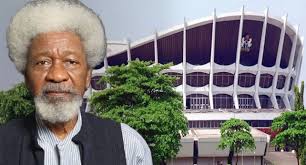
In a significant cultural and political move, President Bola Tinubu has officially renamed Nigeria’s iconic National Theatre to the Wole Soyinka Centre for Arts and Culture. This renaming honors Nobel Laureate Wole Soyinka, a towering figure in African literature and a prominent cultural icon.
Wole Soyinka is not just a national treasure but also a global literary icon. His contributions to drama, poetry, and literature have earned him international acclaim, including the Nobel Prize in Literature in 1986. Renaming the National Theatre in his honor is a fitting tribute to his enduring legacy and influence on the arts.
The renaming symbolizes a renewed commitment to promoting arts and culture in Nigeria. It reflects an effort to celebrate and preserve the country’s rich cultural heritage. The Wole Soyinka Centre for Arts and Culture is poised to become a hub for artistic expression and cultural education, inspiring future generations of Nigerian artists and thinkers.
Political Implications
President Tinubu’s decision is likely aimed at fostering national unity by honoring a figure who transcends ethnic and political divides. Soyinka’s work and life have consistently advocated for justice, human rights, and the celebration of Nigeria’s diverse cultures.
Renaming the theatre also has implications for Nigeria’s cultural diplomacy. It signals to the world that Nigeria values its intellectual and artistic heritage, potentially attracting international attention and partnerships in the arts.

Challenges and Criticisms
While many will celebrate the renaming, some may view it as erasing a part of Nigeria’s history. The National Theatre has its own legacy and historical significance, having been a landmark since its construction in 1976. Balancing the old with the new will be crucial in ensuring broad public support.
Critics might argue that the move is politically motivated, aimed at gaining favor with certain intellectual and cultural elites. Ensuring that the renaming translates into concrete support for the arts, such as increased funding and infrastructure improvements, will be essential to mitigate such criticisms.
Future Prospects
The transformation into the Wole Soyinka Centre for Arts and Culture should be accompanied by a revitalization of the facility itself. This includes modernizing the infrastructure, expanding programming to include a diverse range of cultural activities, and ensuring accessibility for all Nigerians.
The Centre can become a focal point for educational initiatives, offering workshops, seminars, and performances that highlight Nigeria’s rich cultural traditions. Collaborations with schools, universities, and international cultural organizations could further enhance its impact.
President Tinubu’s renaming of the National Theatre to the Wole Soyinka Centre for Arts and Culture is a move that honors one of Nigeria’s greatest literary figures while potentially reinvigorating the nation’s cultural scene. The success of this initiative will depend on how well it bridges the past and future, ensuring that the legacy of the National Theatre is preserved even as it evolves to meet contemporary cultural needs. With careful planning and commitment, the Wole Soyinka Centre can become a beacon of artistic excellence and cultural pride for Nigeria and beyond.
By : Jide Adesina

